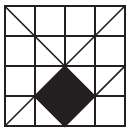Difference between revisions of "1998 AJHSME Problems/Problem 13"
(Created page, added problem, solution, navigational box) |
5849206328x (talk | contribs) (→Solution) |
||
| (3 intermediate revisions by 3 users not shown) | |||
| Line 1: | Line 1: | ||
| − | ==Problem | + | ==Problem== |
What is the ratio of the area of the shaded square to the area of the large square? (The figure is drawn to scale) | What is the ratio of the area of the shaded square to the area of the large square? (The figure is drawn to scale) | ||
| Line 13: | Line 13: | ||
<math>\text{(A)}\ \dfrac{1}{6} \qquad \text{(B)}\ \dfrac{1}{7} \qquad \text{(C)}\ \dfrac{1}{8} \qquad \text{(D)}\ \dfrac{1}{12} \qquad \text{(E)}\ \dfrac{1}{16}</math> | <math>\text{(A)}\ \dfrac{1}{6} \qquad \text{(B)}\ \dfrac{1}{7} \qquad \text{(C)}\ \dfrac{1}{8} \qquad \text{(D)}\ \dfrac{1}{12} \qquad \text{(E)}\ \dfrac{1}{16}</math> | ||
| − | == | + | ==Solutions== |
| + | === Solution 1 === | ||
We can divide the large square into quarters by diagonals. | We can divide the large square into quarters by diagonals. | ||
| Line 21: | Line 22: | ||
<math>\frac{1}{4}\times\frac{1}{2}=\frac{1}{8}=\boxed{C}</math> | <math>\frac{1}{4}\times\frac{1}{2}=\frac{1}{8}=\boxed{C}</math> | ||
| + | === Solution 2 === | ||
| + | Answer: '''C''' | ||
| + | |||
| + | [[File:1998ajhsme-13-2.png]] | ||
| + | |||
| + | Divide the square into 16 smaller squares as shown. The shaded square is formed from 4 half-squares, so its area is 2. The ratio 2 to 16 is 1/8. | ||
== See also == | == See also == | ||
| − | {{AJHSME box|year=1998| | + | {{AJHSME box|year=1998|num-b=12|num-a=14}} |
* [[AJHSME]] | * [[AJHSME]] | ||
* [[AJHSME Problems and Solutions]] | * [[AJHSME Problems and Solutions]] | ||
* [[Mathematics competition resources]] | * [[Mathematics competition resources]] | ||
| + | {{MAA Notice}} | ||
Latest revision as of 23:16, 30 March 2015
Problem
What is the ratio of the area of the shaded square to the area of the large square? (The figure is drawn to scale)
![[asy] draw((0,0)--(0,4)--(4,4)--(4,0)--cycle); draw((0,0)--(4,4)); draw((0,4)--(3,1)--(3,3)); draw((1,1)--(2,0)--(4,2)); fill((1,1)--(2,0)--(3,1)--(2,2)--cycle,black); [/asy]](http://latex.artofproblemsolving.com/5/9/b/59b849abaccf2ca59a38fc1cb6adf63f12eae897.png)
![]()
Solutions
Solution 1
We can divide the large square into quarters by diagonals.
Then, in ![]() the area of the big square, the little square would have
the area of the big square, the little square would have ![]() the area.
the area.
![]()
Solution 2
Answer: C
Divide the square into 16 smaller squares as shown. The shaded square is formed from 4 half-squares, so its area is 2. The ratio 2 to 16 is 1/8.
See also
| 1998 AJHSME (Problems • Answer Key • Resources) | ||
| Preceded by Problem 12 |
Followed by Problem 14 | |
| 1 • 2 • 3 • 4 • 5 • 6 • 7 • 8 • 9 • 10 • 11 • 12 • 13 • 14 • 15 • 16 • 17 • 18 • 19 • 20 • 21 • 22 • 23 • 24 • 25 | ||
| All AJHSME/AMC 8 Problems and Solutions | ||
The problems on this page are copyrighted by the Mathematical Association of America's American Mathematics Competitions. 










